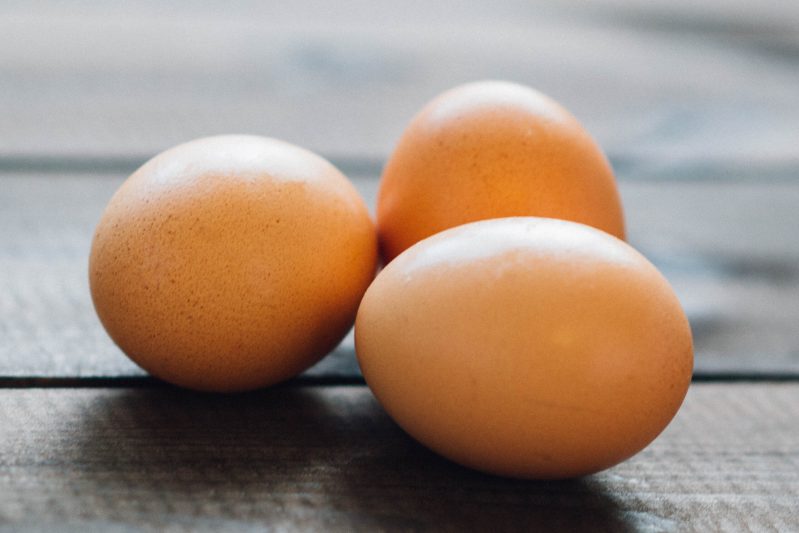Eggs are a delicious source of protein that is common within the American diet. Although there are a variety of eggs, those that stem from chickens are the most commonly consumed and can be prepared in a variety of ways, from scrambled to perfectly poached or even boiled. No matter what makes eggs so wonderful to you, it’s important to tell if eggs are good and how long to keep them for in order to avoid certain illnesses. For this very reason, we’ve rounded up some tips to consider the next time you go shopping.
Do Eggs Have To Be Refrigerated?

Refrigerated eggs are the norm within the United States, but the notion that eggs must be cold is actually not as common as you may think. In fact, the U.S. along with Australia, Scandinavia, The Netherlands, and Japan, are pretty much the only places in the world where refrigeration is necessary. This is due in part by the way eggs are processed and salmonella.
According to the USDA, eggs contain bacteria on the outside shell, processing plants help wash away feces and other debris that can be problematic for humans if ingested. When hens drop their eggs, eggs are shipped over to a processing plant to be rinsed in a sanitizing wash that not only washes the porous shell clean but also helps to kill Salmonella Enteritidis that may have seeped inside it. Though many people consume raw eggs, it isn’t necessarily recommended, as they can potentially cause contamination and illnesses.
Unlike European eggs, that tend to be raw and are commonly sold unrefrigerated, American eggs go through a washing phase, which can add more bacteria to the egg. For this reason, the egg must be washed at a temperature that kills the bacteria without harming the egg. Then once they are cleaned, the USDA advises they be moved to a cooler temperature to prevent bacteria growth.
How Long Do Eggs Last?

Eggs can last a very long time if you are diligent about how you store them. The best way to help your eggs last is to keep them in the back of the fridge, where it’s the coldest. Eggs should never be stored on the door due to the warm temperature, which can reduce your eggs’ freshness. Instead, store them at a temperature of at least 45 degrees Celsius to keep them in top form. Always be sure to read the expiration date, as this will inform you of how long to keep your eggs, however, if you store your eggs correctly, you may be able to bypass the expiration, at least 4 to 5 weeks past the sell-by date.
Other methods of storing your eggs effects it’s freshness, as well. If you have any leftover yolks, whites or dishes that contain eggs, it may be stored up to 2 to 4 days. Egg whites and yolks should always be stored them in an airtight container so they don’t dry out. Other methods, such as hard-boiled eggs, can last for about 1 week, while pickled and frozen eggs can last up to a month or 4 months. When it comes to fresh whole eggs, keeping them in the carton is highly recommended. Not only do egg cartons help keep your eggs intact, but they also prevent other flavors from seeping into your eggs.
How To Know If Eggs Are Still Good

If you’ve had your eggs for white some time and want to know whether or not you can still use them, there are some methods you can try that will help determine their freshness. One popular technique, the float method is super easy. All you’ll need to do is drop your egg in water and if it floats, it’s bad, if it sinks, it’s good. Since gases form during an egg’s decomposition phase, this causes it to float and is a good indicator that it’s past it’s prime.
Another method you can try is the sniff test. By conducting the sniff test, you’ll be able to discern if an egg has gone bad if it emits a sulfuric smell. Before conducting this test, check for any sliminess and if the egg appears worn or rotten in any way, simply discard. If not, crack open on a clean plate and check for any cloudiness or signs of discoloration. An egg that is good shouldn’t emit any type of odor. If it does release a strong smell, then it’s time to purchase a new batch.
Additionally, eggs will also typically have a Julian date stamped on them, the 3-digit number that correlates to when the eggs are best used by, with January first being 001 and December 1st as 365. Though most eggs include an expiration date, so if you aren’t sure if your eggs have gone bad, it’s always a good idea to check this date.
Eggs are a quality staple that can be enjoyed in a variety of ways. Although they can be cracked easily, their structure also makes them susceptible to certain bacteria. For this reason, it’s important to maintain the quality of your eggs so you can keep them and yourself healthy.
